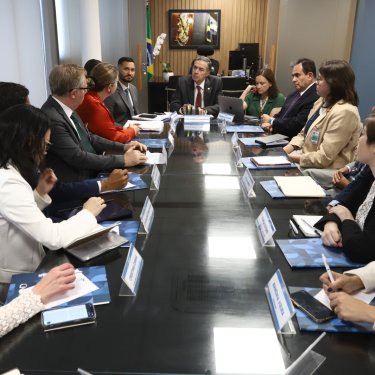Brazil’s supreme court president asked to rein in judicial harassment of journalists

Reporters Without Borders (RSF) and ten other press freedom organisations are calling for bold decisions by Brazil’s new supreme court president in order to rein in judicial harassment of the media at a time of growing misuse of the Brazilian justice system with the aim of silencing journalists
The supreme court already ended a judicial ordeal for the Gazeta do Povo newspaper at the start of October by quashing dozens of defamation proceedings that judges and prosecutors in various cities in Paraná state had brought against this newspaper since 2016. The court ruled that there had been a “dysfunctional and illegitimate use of the right of action” by these judicial officials “with the aim of intimidating the press.”
It was as a result of this decision that RSF and ten other national and international press freedom organisations met with the supreme court’s new president, Luís Roberto Barroso, at the headquarters of the National Justice Council (CNJ) on 16 October, and drew his attention to many other examples of judicial harassment like the Gazeta do Povo case.
The supreme court will soon examine two appeals claiming that legal proceedings permitting harassment of journalists are unconstitutional. As amicus curiae in one of these cases (ADI 7055), RSF has asked the court to rule that, when lawsuits are brought against a journalist or media outlet in several cities – a modus operandi seen in the Gazeta do Povo case – they should all be judged in the place where the journalist lives or the media has its headquarters. Justice Barroso said he asked for the two appeals to be reexamined, and undertook to take media concerns into account.
The supreme court decision in the Gazeta do Povo case – recognising that the right to legal recourse was abused with the aim of intimidating and forcing the media to stop publishing information in the public interest because it was uncomfortable for judges and prosecutors – is fundamental. This kind of misuse of legal recourse with the sole aim of silencing journalists is growing in Brazil. In the two appeals that it will examine soon, the supreme court has a historic opportunity to give a response that will help to rein in this alarming trend, which is undermining safeguards for the right to press freedom in Brazil.
Held responsible for what interviewees say
During their 16 October meeting with the supreme court president, RSF and its partners also expressed deep concern about media outlets and journalists being held legally responsible for the comments made by the people they interview.
This permanent threat hanging over the media encourages self-censorship and restriction of the public’s right to news and information, on which the supreme court will also have to rule soon. In view of the importance of its ruling and its consequences, the press freedom organisations asked the supreme court president to consult civil society before reaching a decision.
The following organisations took part in the meeting:
- Reporters Without Borders - RSF
- Brazilian Investigative Journalism Association - Abraji
- Brazilian Radio and TV Broadcasters Association - Abert
- National Newspapers Association - ANJ
- Brazilian Press Association - ABI
- Digital Journalism Association - Ajor
- Tornavoz Institute
- Committee to Protect Journalists - CPJ
- Intervozes
- National Federation of Journalists - FENAJ
- Open Word Institute
The coalition also includes:
- Vladimir Herzog Institute - IVH
- Association of Education Journalists - Jeduca
